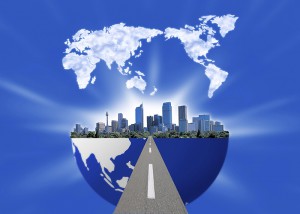 A new report from McKinsey Global Institute describes the impact of global flows on trade, finance, people, and data. It’s a fascinating report, with data that is sure to impact global recruiting in the years ahead. The increase in global flows started in the early 1990s as developing economies in eastern Europe and Asia began to open up to outside influences. There is a dramatic shift underway due to increasing global prosperity and the explosion in Internet connectivity and digital technologies.
A new report from McKinsey Global Institute describes the impact of global flows on trade, finance, people, and data. It’s a fascinating report, with data that is sure to impact global recruiting in the years ahead. The increase in global flows started in the early 1990s as developing economies in eastern Europe and Asia began to open up to outside influences. There is a dramatic shift underway due to increasing global prosperity and the explosion in Internet connectivity and digital technologies.
Some of the key findings from the McKinsey report include:
The largest increases are being seen in the knowledge-intensive portion of the global flows. Indeed, these flows are responsible for half of all global flows and continue to expand. This compares to previous domination from capital- and labor-intensive flows seen from low-cost manufacturing centers. Knowledge-intensive goods and services are defined as those which have a high R&D component or which require highly skilled labor. Some examples include pharmaceuticals, semiconductors, or payments for royalties and patents. Compared to labor-intensive sectors such as toys or textiles, knowledge-intensive trade sectors are growing much faster. Currently, developed countries account for two-thirds of knowledge-intensive flows. To compete effectively, emerging economies will have to invest in activities to build skilled workforces, support greater innovation, and improve technological infrastructure. There will continue to be great demand for global recruiting in knowledge-intensive sectors.
Digital technologies are creating more opportunities for companies, entrepreneurs, and indviduals to participate. As the movement and payment of goods becomes more and more driven by digital technologies, small companies and even single individuals have the ability to buy and sell products and services across borders. Some of these changes are occurring as ‘tangible’ products turn into ‘digital’ products, such as the rise of e-books and digital music, or even the advent of 3-D printing. There has also been an increase in the virtual flow of people as digital file-sharing services such as Google Docs, SkyDrive, or Dropbox, make it easier for people to work remotely from anywhere. Online labor marketplaces can bring jobs to people, instead of requiring people to move to where the jobs are. Crowdsourcing and crowdfunding platforms enable even the tiniest of entities to work globally.
The world economy gets more and more interconnected as global flows increase. Today, 35 percent of all goods cross borders, up from 20 percent in 1990. Over one-third of all financial transactions are international. The speed of the growth is equally remarkable in some cases: Skype call minutes have increased more than 500 percent in less than five years. However, the movement of people and services continues to lag as human capital continues to be relatively immobile. Foreign students and short-term travelers are experiencing moderate growth.
Global recruiting opportunities will continue to be strong as the world becomes more and more interconnected and interdependent.
